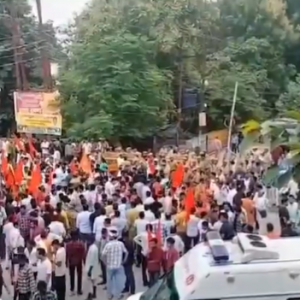100 days of Israel’s catastrophic aggression against Palestine
For 100 days, Palestinian territories have trembled under the weight of retaliation and mass punishment with entire region is in flames under Israeli air strikes
Muslim Network TV News Desk
On a quiet morning on October 7, life in the Israeli-occupied territories of Gaza was shaken by a violent storm of steel orchestrated by Hamas fighters. They had broken the invincibility of one of the world’s most sophisticated and brutal armies.
Before the sun could dispel the night, Hamas fighters, looking like shadows, invaded southern Israel using a variety of means. From ordinary motorcycles to unconventional paragliders, they invaded and revived the Palestinian issue, which many thought was bartered with the Arab states’ peace deal with Israel. The Israeli defense forces were taken completely by surprise, resulting in at least 1,200 casualties along the border.
The epicenter of the war soon shifted to the Gaza Strip, where every home became a tragic victim of an Israeli attack and its brutal mass punishment.
Over the past 100 days, Gaza has trembled under the weight of retaliation and mass punishment, with the entire strip ablaze from Israeli airstrikes.
As days turned into weeks, the death toll in Gaza rose dramatically: 23,843 dead in Gaza and 347 in the West Bank. Shockingly, 75% of these victims were children, women, and the elderly. The landscape of Gaza bore the scars of destruction, over 7,000 Palestinians were trapped under the rubble of their homes, and more than 60,000 were injured, most of them children and women.
Thousands gathered in Tel Aviv on Sunday evening to commemorate the events of October 7. Everyone was thinking above all of the 130 or so hostages kidnapped by Hamas, some of whom may not have survived.
International pressure mounted, and even Israel’s closest ally, the United States, expressed concern about the number of civilian deaths and the “indiscriminate bombings.” President Biden’s remarks indicated that Israel’s actions were straining its support in the world.
Gideon Levy, a columnist for the Israeli newspaper Haaretz, speculated on the duration of the war, claiming that it depends on American approval. Even if the war might not last many more weeks, the consequences and possible resistance remained worrying.
“Israel had no intention of stopping its attacks on Hamas positions and the immediate future looked bleak for civilians living in appalling conditions in Gaza,” he said.
-Failure of international community
At the UN Security Council, as usual the U.S. came in defense of Israel and vetoed resolutions seeking a cease-fire.
As the international community stood idle to the Israeli assault, South Africa filed a lawsuit with the ICJ accusing Israel of genocide in the Gaza Strip. The world court heard both sides for over two days.
The impact of the conflict on Gaza goes beyond the number of casualties, and the staggering numbers show the extent of the suffering. From destroyed infrastructure to health problems, displaced families, and attacks on journalists and public institutions, the humanitarian crisis has been profound and has left a lasting mark on the region.
The Israeli offensive has damaged 69,300 housing units and damaged 290,000 others, according to Gaza’s government media office.
Figures released by the media office showed that 121 ambulances were struck and 30 hospitals, 150 health care institutions and 53 health care centers were forced out of service by the Israeli attacks.
The office said 95 schools were also destroyed, 295 damaged, 145 mosques demolished and 243 others partially damaged by the Israeli onslaught.
Churches were not spared from the Israeli bombing either. The government office said that three churches in Gaza were severely damaged, while 200 archaeological sites were destroyed.
The ongoing Israeli attacks have forced tens of thousands of Palestinians to flee their homes.
“Around one million people have arrived in Rafah city in southern Gaza since the outbreak of the Israeli war,” municipal chief Ahmed al-Soufi said.
“Municipal authorities are no longer able to control all basic services in the city, particularly waste collection amid the high number of refugees,” he added.
Similar situations were reported in cities in the central and northern Gaza Strip amid severe fuel shortages, causing the outbreak of diseases among residents and displaced people, especially children.
Lack of clean water makes displaced people and residents unable to maintain the hygiene necessary to prevent diseases amid warnings of famine in the Palestinian territory.
Last week, UNICEF warned that over 1.1 million children are threatened by the intensifying conflict, malnutrition and diseases in the Gaza Strip.
Gaza’s health sector also suffers from a scarcity of medicines and medical supplies amid Israel’s blockade on the enclave.
Since Oct. 7, Israel has shut all crossings with Gaza, while the Rafah crossing between the Palestinian territory and Egypt has been partially opened for the entry of limited aid.
Up to 200 trucks have been able to enter Gaza each day, according to the White House. That is a fraction of the roughly 500 shipments that entered daily prior to the start of the war when needs were far less acute.
The effects of the conflict were not limited to the Gaza Strip; there were also considerable losses and casualties in the West Bank. The number of Palestinians killed and injured in the West Bank painted a bleak picture of the overall situation.
The impact of the conflict extended beyond the borders of Palestine, as the Israeli army carried out actions in Lebanon and Syria that contributed to the escalation of the crisis.
The financial cost of the war was also considerable, with both sides paying a high price in terms of casualties and expenditure.
The war has been worse for the media as well. So far 117 journalists have been killed and 80 wounded and 169 media offices damaged by Israeli attacks.
The future remains uncertain as the region is in turmoil and hopes for peace and stability are fading as Israel refuses to abide by the international law and rejects every effort to settle the issue of Palestine.







